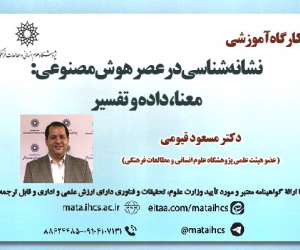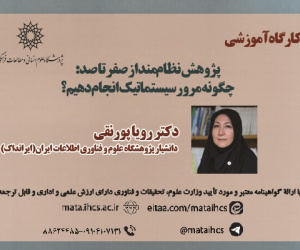جایگاه مفهوم «افردنس» در اندیشه لویی کان
آرشیو
چکیده
ایدئولوژی معماری مدرن و توجه محض آن به عملکردگرایی، ضعف در ارج نهادن به حیات و نیاز های انسانی را در پی داشت. در این راستا در روانشناسی محیط نظریه "افردنس" مطرح می شود که بر نیازهای انسان و ارتباط انسان با محیط تأکید دارد. از دیگر سو در دهه پنجاه با سکوت معماری مدرن، لویی کان فرصتی برای شکوفایی اندیشه های خود به دست می آورد. او که افول جایگاه روح انسانی و عدم توجه معماران به نیازهای انسان را مشاهده نموده است، مبانی فکری اش را بر اساس نیاز انسان، نظم حیات طبیعت و جهان هستی شکل می دهد تا جایگاه انسان در معماری و عالم را به درستی تبیین کند.این پژوهش، اشتراک زیربنایی مابین مفهوم افردنس و اندیشه ی لویی کان بر محور نیازهای انسان را به عنوان فرضیه، مبنای تحلیل خود قرار می دهد و قصد دارد تا این اشتراکات را بیان و چگونگی نمود این مفهوم را در اندیشه های لویی کان تبیین کند. در این راستا به این شناخت می رسد که افردنس محیط، مفهومی در جهت پاسخگویی محیط به نیازهای فطری انسان و پوشش دهندگی روابط میان افراد و محیط است این مفهوم در اندیشه لویی کان با واژه امکانات تحقق می یابد. کان محیط دارای امکانات را بودنی هایی می داند که دربردارنده نهادهای انسانی است. این نهادها برگرفته از نیازهای اساسی انسان ها هستند و از سرچشمه هستی پدید می آیند و در شرایط مختلف، تنها بیان جدیدی می یابند. کان همچنین بودنی ها را تابع قابلیت و ثابت می پندارد زیرا از ماهیت چیزها برای بودن و نهادهای انسانی- که هر دو ثابت هستند- پدید آمده اند. بنابراین پژوهش پیشنهاد می دهد که معمار و طراح برای طراحی محیط دارای افردنس بایستی ابتدا نیازهای اساسی و فطری انسان ها را شناخته و آن ها را در طراحی خود مدنظر قرار دهد در این صورت است که با گذر زمان انسان های مختلف می توانند محیط را پاسخگوی نیازهای خود بیابند و با قرارگیری در این محیط به رشد و نهایت هستی خود دست یابند.The Position of the Concept of "Affordance" in Louis Kahn's Thought
The ideology of modern architecture, with its sole focus on functionalism, led to a neglect of human life and needs. In response, environmental psychology introduced the theory of "affordance," which emphasizes human needs and the relationship between humans and their environment. Meanwhile, in the 1950s, as modern architecture fell silent, Louis Kahn found an opportunity to develop his own ideas. Observing the decline of the human spirit and architects' disregard for human needs, Kahn shaped his philosophical foundations around human needs, the order of nature, and the universe, aiming to properly articulate the role of humans in architecture and the world.This research hypothesizes a fundamental connection between the concept of affordance and Louis Kahn's thought, centered on human needs, and seeks to analyze and articulate these shared principles. It explores how the concept of affordance manifests in Kahn's ideas. The study concludes that environmental affordance is a concept aimed at addressing the innate needs of humans and facilitating the relationship between individuals and their environment. In Kahn's thought, this concept is realized through the term "possibilities." Kahn describes environments with possibilities as "existences" that encompass human institutions. These institutions arise from fundamental human needs and originate from the essence of existence, merely finding new expressions under different conditions. Kahn also views these existences as dependent on capability and constant, as they emerge from the nature of things and human institutions—both of which are unchanging. Therefore, the research suggests that architects and designers must first understand and incorporate the fundamental and innate needs of humans into their designs to create environments with affordance. Only then can diverse individuals, over time, find the environment responsive to their needs and achieve growth and fulfillment through their interaction with it.







